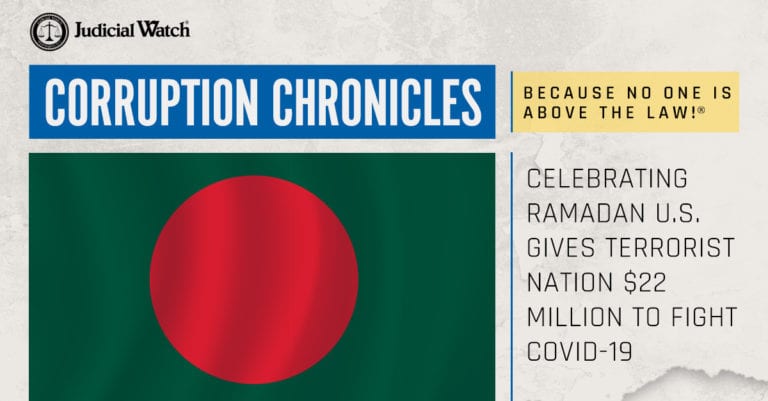

Celebrating Ramadan U.S. Gives Terrorist Nation $22 Million to Fight COVID-19


Celebrating the Muslim holy month of Ramadan, the U.S. is giving an Islamic country well known as a terrorist recruiting ground $22 million to combat coronavirus disease. In a ceremony announcing that American taxpayers are among the world’s first to provide funds for Bangladesh’s COVID-19 “readiness and response” efforts the Trump administration’s ambassador to the South Asian country noted that Ramadan serves as a reminder to be thankful for the front-line workers confronting the health crisis. “You are all genuine heroes,” said U.S. Ambassador to Bangladesh Earl Miller during a virtual lunch event at the American Embassy in Dhaka last week. “You deserve our immense gratitude.”
At the function, the State Department announced the official launch of the U.S.-funded COVID-19 readiness and response initiative, which includes “enhancing risk communication messages to increase knowledge and dispel myths and misconceptions.” The money will also strengthen diagnostic and laboratory capacity, increase case management and infection prevention and control practices. A special program will also be created to train Bangladeshi doctors through the Ministry of Health and Family Welfare as well as Bangabandhu Sheikh Mujib Medical University (BSMMU). “The course provides doctors with useful information on COVID-19, including how to deal with it as a health professional while ensuring one’s own protection and safety, and can be accessed for free by doctors anywhere in Bangladesh through the government’s e-learning platform Muktopaath,” the State Department announcement says. The U.S. is also helping the government of Bangladesh develop an electronic logistics management information tool to track and manage the commodities needed for COVID-19 prevention.
Bangladesh is hardly the only country to receive COVID-19 funds from Uncle Sam. Since the outbreak, the U.S government has committed more than $900 million worldwide in emergency health, humanitarian, economic and development assistance aimed at helping governments and international organizations fight the pandemic. “This funding will save lives by improving public health education, protecting healthcare facilities, and increasing laboratory, disease-surveillance, and rapid-response capacity in more than 120 countries,” according to the State Department. The U.S. has long been the world’s largest provider of bilateral assistance in public health. Since 2009, American taxpayers have generously made available more than $100 billion dollars in health assistance and nearly $70 million in humanitarian assistance globally. In the last two decades Bangladesh has received north of a billion dollars in health assistance, which the U.S. claims underscores a long-term commitment to ensuring access to quality, lifesaving health services for all people in Bangladesh.
While American tax dollars pour in, the Islamic nation is a hotbed of terrorism and a recruiting ground for groups such as the Islamic State of Iraq and Syria (ISIS) and Al-Qaeda Indian Subcontinent (AQIS). Bangladesh’s history with violent extremism goes back to the 1990s when veterans of the anti-Soviet fight in Afghanistan returned to the country, according to the State Department’s Overseas Security Advisory Council (OSAC). In its 2019 report, OSAC writes that ISIS formally announced its foothold in Bangladesh back in 2015 and that anti-Western terrorist groups, some on the U.S. Government’s list of foreign terrorist organizations, are active in Bangladesh, including Harakat ul-Jihad-i-Islami/Bangladesh (HUJI-B), Jamaat-ul-Mujahideen Bangladesh, AI, and ABT. “Terrorist groups continue to communicate their desire to target Westerners in Bangladesh,” according to the OSAC report. “ISIS threatened to continue discovering security gaps and holes to target expats, tourists, diplomats, garment buyers, missionaries, [and] sports teams in Bangladesh.” The State Department has also determined that Bangladesh faces potential threats from returning foreign fighters, citing the return of at least 50 Bangladeshi citizens who traveled to Iraq and Syria to fight for ISIS.
Another alarming tidbit is the surge in Bangladeshi migrants trying to enter the U.S. via Mexico, presumably to carry out attacks. A congressional probe made public last year reveals that migrants from terrorist nations are trying to enter the United States through the southern border at record rates, including an astounding 300% increase in Bangladeshi nationals attempting to sneak into the country through Texas alone. Shortly after the congressional report was released, federal authorities arrested a Mexican-based Bangladeshi smuggler in Houston and charged him with bringing in 15 fellow countrymen through the Texas-Mexico border. His name is Milon Miah and he lives in Tapachula, in the southeast Mexican state of Chiapas bordering Guatemala.















